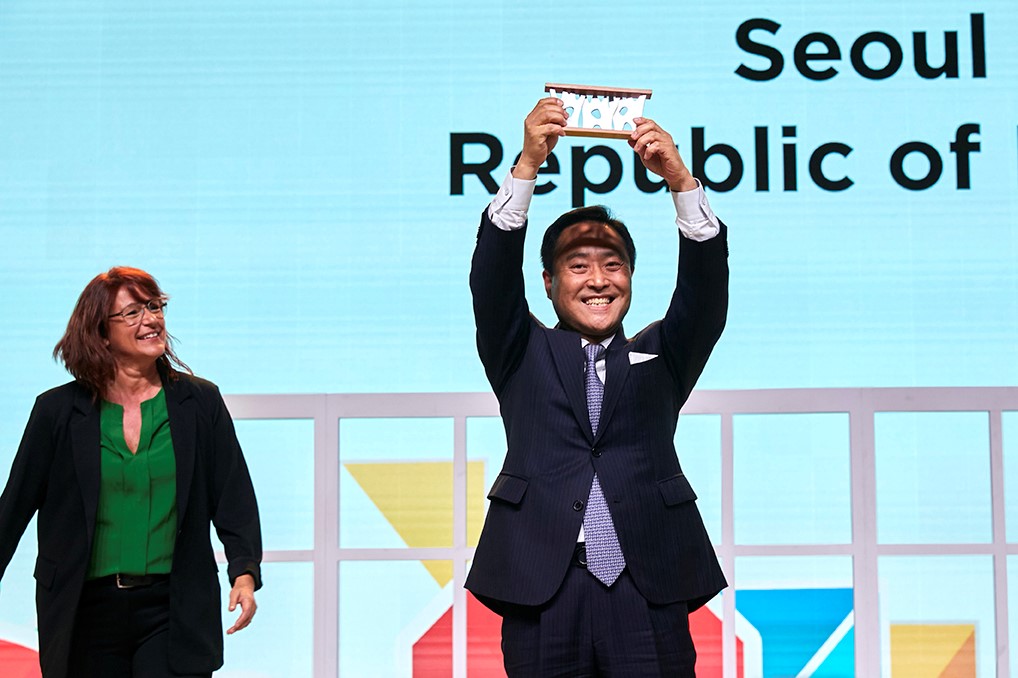
Photo: Smart City Expo
Seoul wins top award at Smart City Expo 2022
16 November 2022
by Christopher Carey
Seoul took home the top accolade at the World Smart City Awards 2022 in Barcelona for its digital inclusion policy that guarantees five basic digital rights to the socially vulnerable – communication, mobility, education, safety and tech utilisation.
The South Korean capital’s commitment to digitalisation along with advancements in online engagement through its metaverse platform were key to the win, Seoul Digital Foundation Chairman Yosik Kang told Cities Today.
“With our digital inclusion policy, we’re trying to make a better life for everyone in Seoul.
“We’re also planning to develop our metaverse platform over the next five years, and turn it into something more inclusive.”
Metaverse
The platform – first announced in November 2021 – aims to create a metaverse environment for all administrative services, including economy, education, culture and tourism.
“We’ve already completed the pilot, which was a success with over 16,000 avatars created, and will officially launch the website early next month,” Kang said.
He added: “We hope this [award] can give strength to the citizens of Seoul who are struggling after the Itaewon crowd crush.”
Presenting the award, Barcelona’s Deputy Mayor Laia Bonet said the city “has been proven to be an inspiration for those concerned by inequalities.”
Resilience
The smart city jury also selected Ukraine’s capital Kyiv for a ‘special recognition’ award in the same category for the digital resilience it has demonstrated since the Russian invasion.
Through repurposing the Kyiv Digital app in a matter of days, the city can notify citizens of air raids and shelter locations that help save lives.
“The war on Ukraine is a war on our common values of democracy and shared prosperity,” Bonet added.
“Our colleagues from Kyiv know this better than anyone.
“They are defending peace and human rights, and I am sure I don’t speak on behalf of Barcelona only when I say that we stand by you.”
Winners
This year’s jury was comprised of representatives from Barcelona City Council, UN-Habitat, the World Bank, the EC Mission on Climate Neutral and Smart Cities, and Smart City Expo World Congress.
In total, the 2022 Call for Awards received 337 submissions from 60 countries worldwide.
The Irish capital Dublin received the Governance & Economy Award for its drone development project, while Amsterdam received an award for its youth cybersecurity game HackShield in the Security & Safety category.
The Inclusion award went to The Global Initiative for Inclusive ICTs (G3ict) for the city of Atlanta’s project using artificial intelligence for inclusive pavements.
In the Energy & Environment category, the award went to a software project developed by TerraGo Technologies for the maintenance and implementation of public lighting in Chicago.
Wiesbaden’s DIGI-V traffic digitisation initiative, developed by Yunex Traffic, won in the Mobility category,
The Argentinean capital, Buenos Aires, received the Infrastructure & Building Award for the Ciudad 3D project, a new tool to promote sustainable urban development. In the Enabling Technologies category, the winner was the Belgian city of Bruges for its Smart City Data Platform, which also involves the cities of Leuven and Roselare.
Two projects tied as winners in the Innovation category: Uganda’s AutoSafety programme, developed by Wanyama Autosafety Initiatives, to reduce accidents and pollution; and the Indian Ministry of Housing and Urban Affairs’ Empowering Cities through Data project.
Finally, the Leadership award, which is given to individuals and organisations that have promoted the development of smart urban solutions at an international level, went to the Emilia Saiz, UCLG – United Cities and Local Governments General Secretary, and Aníbal Gaviria, the Governor of Antioquia (Colombia).









